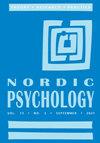Editorial
IF 1.1
4区 心理学
Q4 PSYCHOLOGY, MULTIDISCIPLINARY
引用次数: 0
Abstract
This issue of Nordic Psychology has a number of interesting and important articles to be read during the beautiful Nordic fall. The articles cover important and interesting themes like working memory, social support, the Modified Cognitive Reserve Scale, the normative dimensions of educational psychological practice and a critique of Hattie’s theory of Visible Learning. In the first article of this issue “Face-to-face working memory training does not enhance children’s reading comprehension a pilot study with Danish children” Hanne Knudsen and Kristine Jensen de L opez test a non-computerized Working Memory training method to improve children’s reading comprehension in a longitudinal design. 38 Danish children in 3rd and 4th grade divided into a training group and a control group. The results showed that Verbal Working Memory and reading comprehension were not improved following training. Visuo-spatial Working Memory improved at post-training, but the effect did not last into the one-year follow up. The role of Working Memory in reading comprehension and the pedagogical implications for teaching are discussed in the article. In the second article of this issue “Why does Perceived Social Support Protect against Somatic Symptoms: Investigating the Roles of Emotional Self-Efficacy and Depressive Symptoms” Ingrida Grigaityte and Patrik S€ oderberg investigate the roles of emotional self-efficacy and depressive symptoms as mediators of the effect of social support on physical health, based on a regionally representative sample in Finland. The study found that (a) perceived social support was associated with less somatic symptoms, (b) the relationship between perceived social support was partially and significantly mediated by both emotional self-efficacy and depressive symptoms, and (c) there was sign of a moderated mediation: the association between perceived social support and somatic symptoms was stronger for girls than for boys, and this association was primarily accounted for by the mediating role of depressive symptoms. In third article of this issue “Active lifestyle as a reflection of cognitive reserve – the Modified Cognitive Reserve Scale” Kristiina Relander, Kaisa M€aki, Soinne Lauri, Juan Garc ıa-Garc ıa and Marja Hietanen examine the usefulness, validity and reliability of a modified Finnish translation of the Cognitive Reserve Scale, the Modified Cognitive Reserve Scale. The Modified Cognitive Reserve Scale consists of 20 questions concerning studying and information seeking, hobbies and social relationships during three age phases. A group of 69 neurologically healthy adults aged 26–78 filled the Modified Cognitive Reserve Scale and completed a neuropsychological test battery. The result showed that the Modified Cognitive Reserve Scale was significantly associated with occupation and education but not with age or gender. There were significant associations between the Modified Cognitive Reserve Scale and verbal reasoning, visual reasoning, learning, and inhibition. The study suggests that the Modified Cognitive Reserve Scale is a reliable and valid method to assess lifelong leisure activity. In the fourth article of this issue “The Normativity of Educational Psychology Practice” Thomas Szulevicz argues that normative reflections tend to be overseen in educational psychology practice. The article further claims that when taking a closer look at educational psychology practice, focus has mainly been on how educational社论
本期《北欧心理学》有许多有趣而重要的文章,在美丽的北欧秋天可以阅读。这些文章涵盖了重要而有趣的主题,如工作记忆、社会支持、改良认知储备量表、教育心理实践的规范维度以及对海蒂可见学习理论的批判。在本期的第一篇文章“面对面工作记忆训练不能提高儿童的阅读理解——一项针对丹麦儿童的试点研究”中,Hanne Knudsen和Kristine Jensen de L opez在纵向设计中测试了一种非计算机化的工作记忆训练方法,以提高儿童的读写理解。38名三、四年级的丹麦儿童被分为训练组和对照组。结果表明,训练后言语工作记忆和阅读理解能力没有得到改善。Visuo空间工作记忆在训练后有所改善,但这种影响并没有持续到一年的随访中。本文讨论了工作记忆在阅读理解中的作用及其对教学的启示。在本期的第二篇文章“为什么感知的社会支持可以预防躯体症状:调查情绪自我效能感和抑郁症状的作用”中,Ingrida Grigaityte和Patrik S€oderberg调查了情绪自我效能和抑郁症状作为社会支持对身体健康影响的中介的作用,基于芬兰具有区域代表性的样本。研究发现,(a)感知的社会支持与较少的躯体症状相关,(b)感知的社交支持之间的关系部分且显著地由情绪自我效能感和抑郁症状介导,和(c)有一个适度中介的迹象:感知到的社会支持和身体症状之间的联系女孩比男孩更强,这种联系主要是由抑郁症状的中介作用引起的。在本期的第三篇文章“积极的生活方式作为认知储备的反映——修正的认知储备量表”中,Kristiina Relander、Kaisa M€aki、Soinne Lauri、Juan Garcıa-Garcşa和Marja Hietanen研究了修正的芬兰语翻译的认知储备表的有用性、有效性和可靠性。改良认知储备量表由20个问题组成,涉及三个年龄阶段的学习和信息寻求、爱好和社会关系。一组69名年龄在26-78岁之间的神经健康成年人填写了改良认知储备量表,并完成了一组神经心理学测试。结果表明,改良认知储备量表与职业和教育程度显著相关,但与年龄或性别无关。改良认知储备量表与言语推理、视觉推理、学习和抑制之间存在显著关联。研究表明,改良认知储备量表是评估终身休闲活动的一种可靠有效的方法。在本期的第四篇文章“教育心理学实践的规范性”中,Thomas Szulevicz认为,规范性反思往往在教育心理学实践中受到监督。文章进一步声称,当仔细观察教育心理学实践时,重点主要放在如何进行教育上
本文章由计算机程序翻译,如有差异,请以英文原文为准。
求助全文
约1分钟内获得全文
求助全文

 求助内容:
求助内容: 应助结果提醒方式:
应助结果提醒方式:


